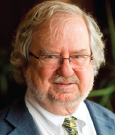James P. Allison, PhD, Chair of Immunology at The University of Texas MD Anderson Cancer Center, has received the 2015 Paul Ehrlich and Ludwig Darmstaedter Prize in recognition of his work in the field of immunotherapy.
“In immunotherapy, it’s not the tumor but the immune system that is targeted. This marks a new therapeutic principle in oncology,” wrote the Scientific Council of the Paul Ehrlich Foundation, explaining its decision to honor Dr. Allison with the prestigious international prize.
Dr. Allison also is Executive Director of MD Anderson’s immunotherapy platform, which supports immunotherapy research across multiple cancer types.
“This award is special to me because it’s named for Paul Ehrlich, the German scientist who was first to suggest immune system surveillance of cancer more than 100 years ago,” Dr. Allison said. “It’s also wonderful recognition of the progress that immunotherapy is making against cancer.”
Immune Checkpoint Blockade
Dr. Allison pioneered a new way to treat cancer by blocking molecules on immune system T cells, which act as a brake on immune response. The treatment, called immune checkpoint blockade, grew out of his basic science research into the biology of T cells, the immune system’s customized attack cells. He developed an antibody to block CTLA-4, a checkpoint molecule on T cells, unleashing an immune attack on tumors. The resulting drug, ipilimumab (Yervoy), has extinguished untreatable late-stage melanoma in 22% of patients for at least 10 years.
The U.S. Food and Drug Administration approved the drug for metastatic melanoma in 2011. Since then, ipilimumab and new drugs that impede other checkpoints have been applied to other solid tumor cancers, including lung, bladder, and kidney cancers.
He shares the 2015 prize with Carl June, MD, of the University of Pennsylvania, who pioneered an approach that customizes a patient’s T cells to attack leukemia.
Other Roles
Dr. Allison is also Deputy Director of the David H. Koch Center for Applied Research of Genitourinary Cancers and holds the Vivian L. Smith Distinguished Chair in Immunology at MD Anderson. He is a member of the National Academy of Sciences and the Institute of Medicine.
Dr. Allison launched his research in T-cell biology during his first stay at MD Anderson, making seminal findings in the early 1980s before moving to the University of California, where his research led to the development of ipilimumab. He then moved to Memorial Sloan Kettering Cancer Center before returning to MD Anderson in 2012. ■


